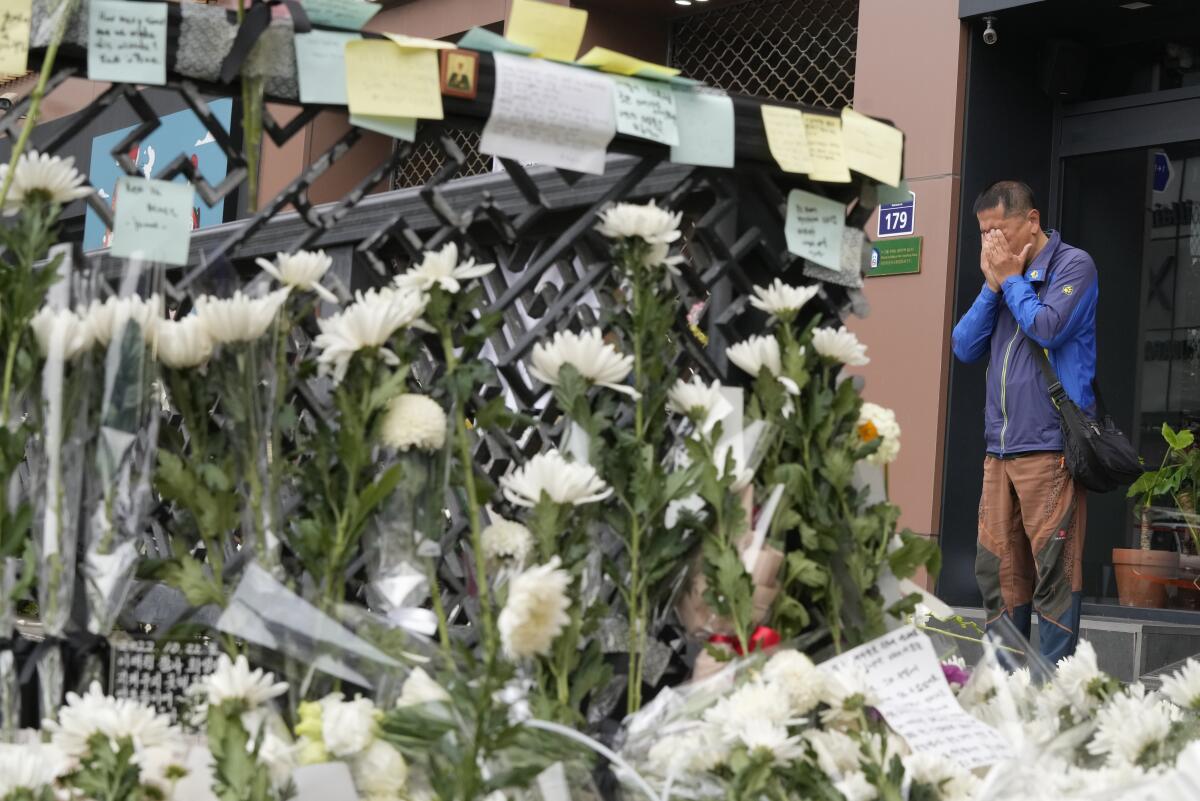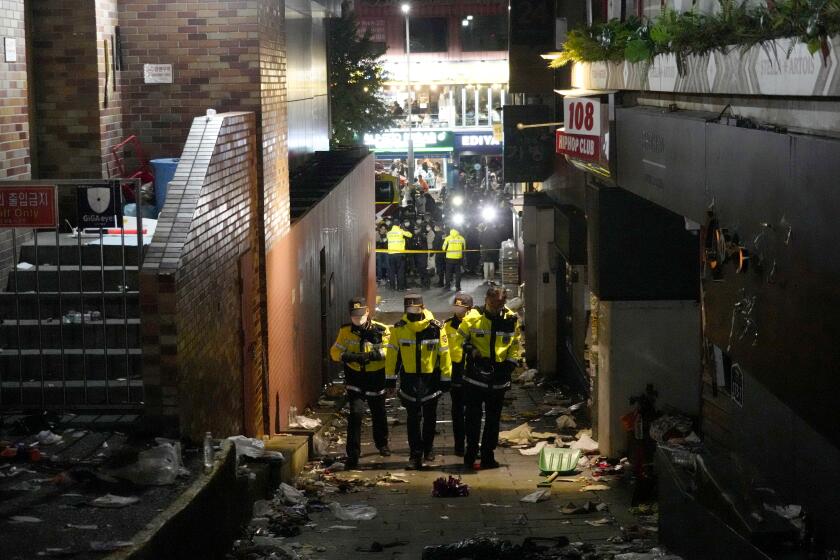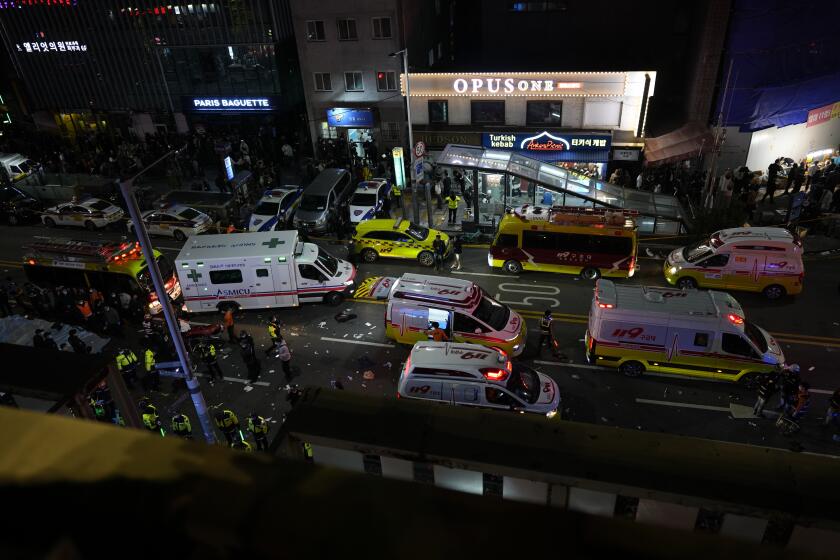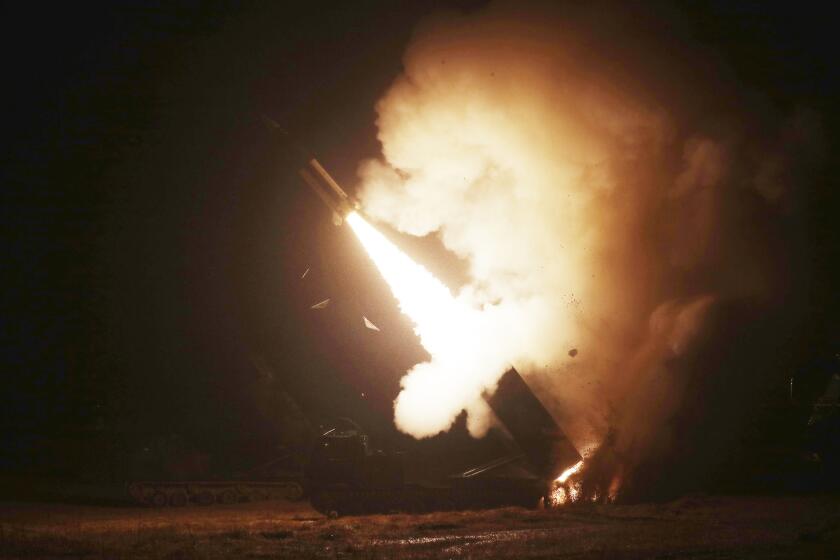South Korean police take responsibility for Halloween crowd disaster

- Share via
SEOUL — South Korean officials admitted responsibility and apologized Tuesday for failures in preventing and responding to the Halloween crowd crush that killed more than 150 people and left residents shocked and angry.
The government faces growing public scrutiny over whether the surging crowds Saturday night in Seoul’s Itaewon district, a popular nightlife area, could have been prevented and who should take the responsibility for the country’s worst disaster in years.
National police chief Yoon Hee-keun said an initial investigation has found that there were many urgent calls by people notifying authorities about the potential danger of the crowd gathering in Itaewon, but officers who received those calls didn’t respond to them in a satisfactory manner.
“I feel a heavy responsibility as the head of one of related government offices,” Yoon Hee-keun, commissioner general of the Korean National Police Agency, told a televised news conference. “Police will do their best to prevent a tragedy like this from happening again.”
Yoon said police have launched an intense internal probe to look deeper into the officers’ handling of the emergency calls and other issues, such as their on-the-spot response to the crowd surge.
Separately, South Korea’s interior minister, emergency office chief, the mayor of Seoul and the head of a ward office that includes the Itaewon neighborhood all offered public apologies.
Some say a cultural gap between South Korea’s elder and younger generations may have contributed to inadequate security at a crowded Halloween event.
Seoul Mayor Oh Se-hoon apologized deeply, wept and briefly halted his news conference as he talked about the parent of a 20-year-old woman who was declared dead earlier in the day.
“When I tried to comfort a person with a daughter hospitalized at the National Medical Center yesterday, they said their daughter would survive and they believed so,” he said. “But I heard she passed away this morning. I am sorry that my apology has come late.”
The disaster — which left at least 156 people dead and 151 others injured — was concentrated in a narrow downhill alley in Itaewon. Witnesses described people falling on one another, suffering severe breathing difficulties and falling unconscious. They also recalled rescuers and ambulances failing to reach the crammed alleys in time because the entire area was packed with slow-moving vehicles and a crowd of partygoers clad in Halloween costumes.
Most of the dead were in their 20s and 30s, and about two-thirds were women.
A stunned Seoul is beginning to determine the scope of a crowd surge that killed more than 150 mostly young people out enjoying Halloween festivities.
During a Cabinet council meeting Tuesday, President Yoon Suk-yeol also acknowledged that South Korea lacks research on a crowd management. He called for using drones and other high-tech resources to develop an effective crowd-control capability. He said the government would soon hold a meeting with experts to review overall national safety rules.
The tragedy is South Korea’s deadliest disaster since the 2014 ferry sinking that killed 304 people and exposed the country’s lax safety rules and regulatory failures. Saturday’s crowd crush has subsequently raised public questions about what South Korea has done to prevent human-made disasters.
“My heart is aching a lot, as all the victims were like my grandchildren,” Chung Kil-soon, 74, said after paying respects at a mourning station Tuesday. “People say our country is an advanced country, but I don’t think we are truly advanced.”
Police launched a 475-member task force to find its the disaster’s cause.
Breaking News
Get breaking news, investigations, analysis and more signature journalism from the Los Angeles Times in your inbox.
You may occasionally receive promotional content from the Los Angeles Times.
Senior police officer Nam Gu-jun told reporters Monday that officers have obtained videos taken by about 50 security cameras in the area and were analyzing video clips on social media. Nam said police have also interviewed more than 40 witnesses and survivors so far.
Police said they had sent 137 officers to maintain order during Halloween festivities Saturday, much more than the 34 to 90 officers mobilized for the event in 2017, 2018 and 2019, before the pandemic. But some observers questioned whether the 137 officers were enough to handle the estimated 100,000 people gathered Saturday in Itaewon.
Adding to the questions about the role of police was the fact that they sent 7,000 officers to another part of Seoul earlier Saturday to monitor dueling protests involving tens of thousands of people. Police also acknowledged that the 137 officers dispatched to Itaewon were primarily assigned to monitor crime, with a particular focus on narcotics use, not crowd control.
The death toll could rise as officials said that 29 of the injured were in serious condition. The victims included 26 foreign nationals, from Iran, China, Russia, the United States, Japan and elsewhere.
A South Korean ballistic missile malfunctioned and fell on land during a drill with the U.S., sparking panic among residents in the city of Gangneung.
President Yoon asked officials to provide the same support to the bereaved families of the foreign victims as to the relatives of the South Korean dead and injured. He also thanked many world leaders for sending condolence messages.
The Itaewon area, known for its foreigner-friendly, cosmopolitan atmosphere, is the country’s hottest spot for Halloween-themed events and parties, with young South Koreans taking part in costume competitions at bars, clubs and restaurants. Saturday’s gathering was the biggest Halloween celebration in the area since the pandemic began.
Halloween festivities in Itaewon have no official organizers. South Korean police said Monday that they don’t have any specific procedures for handling incidents such as crowd surges during an event with no organizers.
More to Read
Sign up for Essential California
The most important California stories and recommendations in your inbox every morning.
You may occasionally receive promotional content from the Los Angeles Times.













